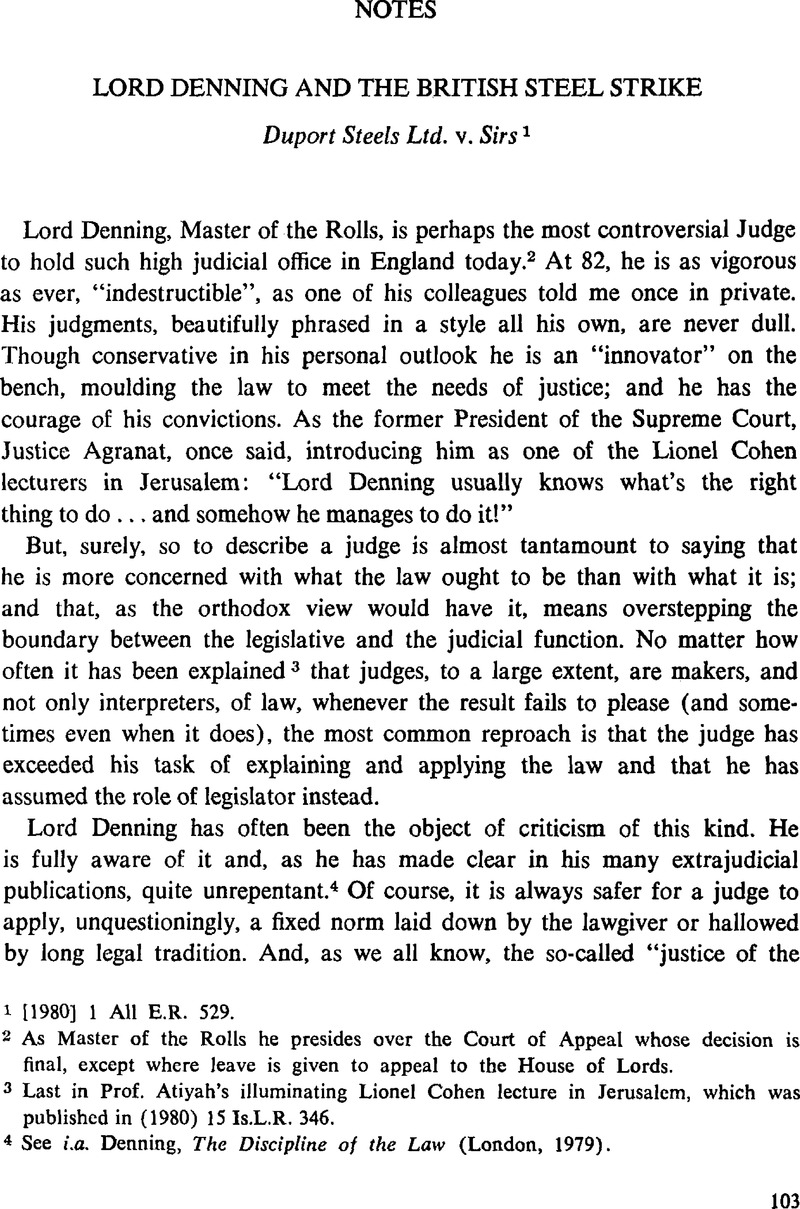No CrossRef data available.
Published online by Cambridge University Press: 12 February 2016

1 [1980] 1 All E.R. 529.
2 As Master of the Rolls he presides over the Court of Appeal whose decision is final, except where leave is given to appeal to the House of Lords.
3 Last in Prof. Atiyah's illuminating Lionel Cohen lecture in Jerusalem, which was published in (1980) 15 Is.L.R. 346.
4 See i.a. Denning, , The Discipline of the Law (London, 1979).Google Scholar
5 See especially Gouriet v. Union of Post Office Workers [1977] 1 All E.R. 696 (reversed in the House of Lords [1977] 3 All E.R. 70); R v. IRC ex p. National Federation of Self Employed and Small Business (1980) 2 W.L.R. 579; and see P. Cane's article in (Autumn 1980) Public Law 303.
6 Duport Steels Ltd. v. Sirs [1980] 1 All E.R. 529.
7 As substituted by the Trade Union and Labour Relations (Amendment) Act, 1976, sec. 3 (2). The section provides: “An act done by a person in contemplation or furtherance of a trade dispute shall not be actionable in tort on the ground only—(a) that it induces another person to break a contract or interferes or induces any other person to interfere with its performance…”
8 I doubt whether a similar question could arise in Israel. The Civil Wrongs Ordinance, 1944, sec. 32 provided (in terms reminiscent of the (English) Conspiracy and Protection of Property Act, 1875), that “Any person who, otherwise than in furtherance of a strike or lockout in respect of a trade dispute within the trade or industry in which the strikers or persons locking out are engaged, knowingly and without sufficient justification, causes any other person to break a legally binding contract with a third person commits a civil wrong against such third person:…” However, following the decision of the Supreme Court in Leo Baeck School v. Union of Secondary School Teachers (1962) 17 P.D. 2205, the words from “otherwise than” to “are engaged” were deleted from the section and instead the following words were added at the end: “… a strike or lockout not being considered a breach of contract”. (1963) 17 L.S.I. 93. To the best of my knowledge the extent of this immunity has not been litigated in our courts.
9 [1980] 1 All E.R. 65.
10 Ibid., at p. 70.
11 Duport at p. 538.
12 MacShane at p. 70.
13 The immediate question which Lord Wilberforce would put to the objective test in MacShane was whether the action was capable of achieving the object. In Duport Steels there could be no doubt about the effectiveness of the action; in fact, it was clear that without extending the strike to the private sector of steel producers the government would not have been forced to order B.S.C. to submit to the workers' demands. Here, in Duport Steels, the question I am concerned with was the reasonableness or morality of the action affecting innocent third parties. In Lord Denning's view, Lord Wilberforce's preference for an objective test applies with equal, if not greater, force to this question.
14 [1964] A.C. 40.
15 Secretary of State for Education v. Metropolitan Borough of Tameside [1976] 3 All E.R. 665, 681.
16 Dwikat et al. v. Government of Israel (1980) (I) 34 P.D. 1.
17 Apai Coop. Ltd. v. Minister of Industry (1980) (II) 34 P.D. 449 at p. 458.
18 [1980] 1 All E.R. at p. 79.
19 [1980] 1 All E.R. at p. 553.
20 MacShane at pp. 71 and 75.
21 MacShane at pp. 73 and 77.
22 MacShane at p. 75.
23 Duport Steels at p. 554.
24 In fact, Parliament has meanwhile passed the Employment Act, 1980, which restricts the immunity of trade unions to a certain extent, especially with regard to secondary strike action. However, the details of the amendment are too complicated to be set out here and, for the time being, reference can only be made to the (rather scanty) summary which appeared in the New Law Journal of September 25, 1980 at p. 887 seq.
25 Lord Diplock's words in Duport Steels at p. 542.
26 Lord Edmund-Davies, ibid., at p. 547.
27 Of course, immunity from tort action does not affect any criminal liability.